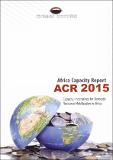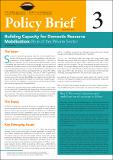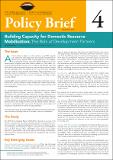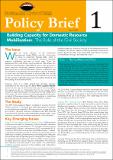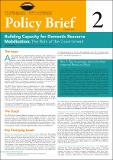The Africa Capacity Report (ACR) 2015 sends a very clear message: with official development assistance to Africa diminishing, the continent will have to rely more on mobilizing domestic resources if it is to implement its development agenda. The ACR 2015 shows that this is possible, with a good number of African countries providing practical success stories based o...
Success in implementing Agenda 2063 and the Sustainable Development Goals depends largely on the availability and adequacy of resources. Africa realizes that industrialization is the way to go, as outlined in the two continental development plans, but it is inevitable that resources to fund these programs must be mobilized domestically. Domestic resource mobilizati...
Africa’s ability to deliver on the ambitious post-2015 Agenda (also called the 2030 Sustainable Development Goals) and the African Union Agenda 2063 largely depends on the availability of adequate financial resources. But the funding sources for development programs have been neither stable nor predictable, particularly after the global financial crisis in 2008. It...
The policy brief by the African Capacity Building Foundation (ACBF) highlights that while it is widely agreed that domestic resource mobilization is the way to go, the 2015 Africa Capacity Report shows that this may not be achieved because of one missing link: the capacity to do so. It highlights that the civil society, which consists of organized groups and instit...
Africa adopted an industrialization strategy, and committed to implement Agenda 2063 and Sustainable Development Goals (SDGs), all of which require adequate funding. Given that no African country fully achieved all the Millennium Development Goals (MDGs) largely due to funding constraints, domestic resource mobilization is therefore a very critical issue. Domestic ...
